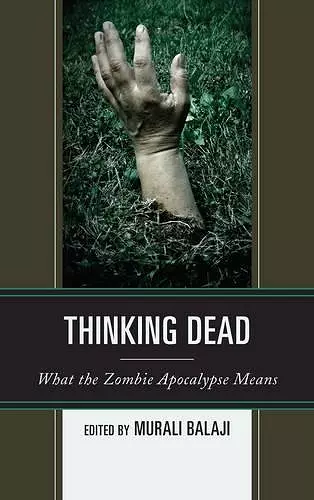Thinking Dead
What the Zombie Apocalypse Means
Format:Paperback
Publisher:Lexington Books
Published:3rd Mar '16
Currently unavailable, and unfortunately no date known when it will be back

Zombies are everywhere these days. We are consuming zombies as much as they are said to be consuming us in mediated apocalyptic scenarios on popular television shows, video game franchises and movies. The “zombie industry” generates billions a year through media texts and other cultural manifestations (zombie races and zombie-themed parks, to name a few). Zombies, like vampires, werewolves, witches and wizards, have become both big dollars for cultural producers and the subject of audience fascination and fetishization. With popular television shows such as AMC’s The Walking Dead (based on the popular graphic novel) and movie franchises such as the ones pioneered by George Romero, global fascination with zombies does not show signs of diminishing. In The Thinking Dead: What the Zombie Apocalypse Means, edited by Murali Balaji, scholars ask why our culture has becomes so fascinated by the zombie apocalypse. Essays address this question from a range of theoretical perspectives that tie our consumption of zombies to larger narratives of race, gender, sexuality, politics, economics and the end of the world. Thinking Dead brings together an array of media and cultural studies scholars whose contributions to understanding our obsession with zombies will far outlast the current trends of zombie popularity.
This eclectic mix of essays considers how the trope of the zombie apocalypse holds the key to understanding humans' constant struggle to form a stable identity in a changeable universe. The essays analyze media productions as varied as the YA romzomcom Warm Bodies, the video game Resident Evil 5, the Chinese film The Note of Ghoul, and the queer, hardcore zombie pornography of Bruce LaBruce. But the volume's most thought-provoking offerings treat the television series The Walking Dead. For example, Angela Cirucci ('The Social Dead') observes that both the figure of the zombie as popularized in The Walking Dead and figures in old photos posted on social media such as Facebook are disturbing reminders of 'former lives' with the potential to threaten the stability of present identities, and Alicia Kozna ('Leaving It All Behind') considers the trend, in apocalyptic narratives, that calls for renunciation of technology as a precondition of re-creating society in a way that values human connection. Most enlightening is Balaji's essay ('Eating the Dead'), which examines the subordination of Tony Kirkman's graphic novel (on which the television series is based) to the series itself and to show-related merchandise. An important contribution the mushrooming field of zombie studies. Summing Up: Highly recommended. All readers. * CHOICE *
Thinking Dead is about brains, in both the zombie and scholarly sense. YA zombies, Chinese zombies, queer zombies, and porn zombies are effectively critiqued for their cultural meanings as are their more well-known shuffler siblings 28 Days Later, The Walking Dead, and Zombieland. Taking an eclectic media and cultural studies perspective, editor Balaji and his contributors persuasively and engagingly decompose zombies as ideological tales about race, gender, class, colonialism, consumption, social media, teen romance, and neoliberalism. -- Matthew P. McAllister, Pennsylvania State University
ISBN: 9781498532402
Dimensions: 230mm x 149mm x 20mm
Weight: 408g
268 pages